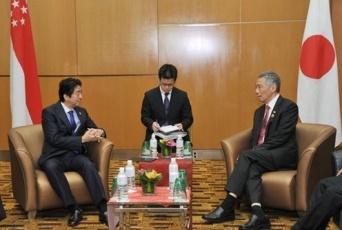Japan-Singapore Relations
Japan-Singapore Summit Meeting
November 22, 2015
 Photo: Cabinet Public Relations Office
Photo: Cabinet Public Relations Office
 Photo: Cabinet Public Relations Office
Photo: Cabinet Public Relations Office
On Saturday, November 21, commencing at around 7:45 p.m. (local time) for approximately 45 minutes, Mr. Shinzo Abe, Prime Minister of Japan, held a meeting with H.E. Mr. Lee Hsien Loong, Prime Minister of the Republic of Singapore, in Kuala Lumpur, Malaysia, where Prime Minister Abe is currently visiting to attend the Association of Southeast Asian Nations (ASEAN)-related summit meetings. The overview of the meeting is as follows.
1 Opening remarks
Prime Minister Abe once again conveyed his congratulations on Prime Minister Lee's reappointment and victory in the general election in Singapore in September this year. Prime Minister Abe also noted that the year 2016 as the 50th anniversary of the establishment of diplomatic relations between the two countries, and will be an important opportunity to highlight the depth of bilateral relations and to further enhance exchanges. Prime Minister Lee expressed his gratitude for Prime Minister Abe's attendance at the state funeral of Mr. Lee Kuan Yew, former Prime Minister of Singapore, in March of this year, and for the attendance of Mr. Taro Aso, Deputy Prime Minister and Minister of Finance, at Singapore's National Day Parade commemorating the 50th anniversary of its independence in August of this year. The two Leaders shared the view to further strengthen the bilateral relations.
2 Bilateral relations
(1) Prime Minister Abe explained that Japan's Legislation for Peace and Security was recently enacted in order to make further advances in tangibly practicing Proactive Contribution to Peace, and will enable Japan to make greater contributions to the peace and stability of the international community through such ways as United Nations Peacekeeping Operations (PKOs) and logistical support. Prime Minister Lee welcomed that the Japan-China-Republic of Korea Trilateral Summit Meeting was recently held successfully, along with expressing expectation that Japan's contributions to political, economic and other strategic challenges will expand to other regions, including the ASEAN region, and not only the Northeast Asia region.
(2) In addition, Prime Minister Abe once again conveyed strong expectation that Japan's Shinkansen system will be adopted for a high-speed railway project, as a flagship cooperation between the two countries, and explained that Japan intends to further deepen cooperation under the "Partnership for Quality Infrastructure."
(2) In addition, Prime Minister Abe once again conveyed strong expectation that Japan's Shinkansen system will be adopted for a high-speed railway project, as a flagship cooperation between the two countries, and explained that Japan intends to further deepen cooperation under the "Partnership for Quality Infrastructure."
3 Challenges in the regional and international community
(1) South China Sea
Prime Minister Abe stated that unilateral actions that change the status quo and heighten tensions, such as large-scale land reclamation and the building of outposts in the South China Sea, are a cause of common concern to the international community. Prime Minister Abe also explained that Japan supports the Philippines' utilization of an arbitration procedure as a method for peacefully resolving maritime disputes from the standpoint of the rule of law.Prime Minister Lee noted the importance of freedom of navigation on the high seas and freedom of overflight, and also commented that it is important to seek to resolve maritime disputes, including in the South China Sea, in ways that conform fully to international law. On that basis, Prime Minister Lee expressed expectation that Japan will perform a constructive role in the discussions, including in relation to the South China Sea.

